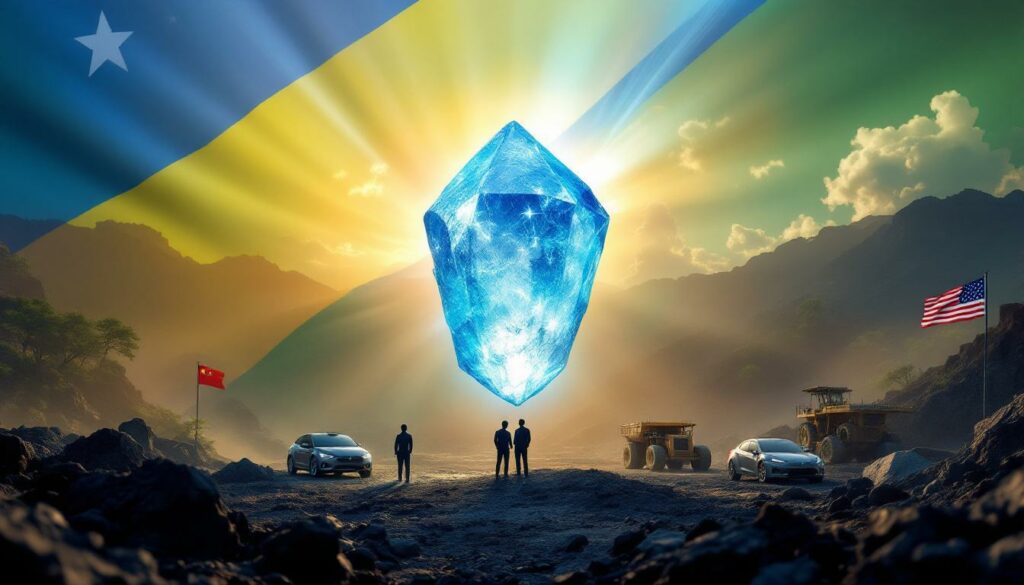What Is KoBold Metals and Why Is Their Congo Deal Significant?
KoBold Metals, a pioneering mineral exploration company backed by billionaire investors Jeff Bezos and Bill Gates, has secured a groundbreaking agreement with the Democratic Republic of Congo (DRC) government. The deal, signed on July 17, 2025, positions the US-based firm to acquire the contested Manono lithium deposit, widely considered one of the world's largest lithium reserves.
This agreement represents a significant shift in the battle for control of critical minerals energy security essential for electric vehicle batteries and the global energy transition. The deal was confirmed by DRC President Félix Tshisekedi via social media, who framed it as a strategic resolution to the ongoing Manono impasse.
"This partnership with KoBold Metals demonstrates our commitment to responsible development of Congo's mineral wealth while ensuring technological advancement in our mining sector," President Tshisekedi noted in his announcement.
The agreement effectively establishes KoBold as the DRC's preferred partner to resolve the ongoing legal disputes and develop this strategic resource, potentially reshaping global lithium supply chains and marking a critical step in Western efforts to secure reliable sources of battery minerals.
What distinguishes KoBold from traditional mining companies is its unique AI-driven mining technology approach, which uses machine learning algorithms to analyze geological data and identify promising mineral deposits with greater precision than conventional methods.
How Did the Manono Lithium Deposit Become Disputed?
The Complex History of Mining Rights
The Manono lithium deposit has been at the center of a prolonged legal battle that exemplifies the geopolitical competition for critical minerals. Australian-based AVZ Minerals initially held the permit to develop the project, having invested significant resources in exploration and preliminary development work.
However, in a controversial move in 2023, the DRC's Mines Ministry revoked AVZ's permit, citing "insufficient progress" in project development. The mining rights were subsequently granted to a subsidiary of Chinese company Zijin Mining, creating an international dispute that has effectively frozen development of one of the world's most promising lithium resources.
Legal Challenges and International Arbitration
This transfer of rights prompted AVZ to seek relief through multiple international legal channels, including:
- The International Court of Arbitration of the International Chamber of Commerce (ICC)
- The International Centre for Settlement of Investment Disputes (ICSID)
These arbitration proceedings represent significant legal obstacles to any development of the Manono deposit, as potential investors and partners face uncertainty about who ultimately holds legitimate rights to the resource.
The dispute highlights the increasingly complex legal landscape surrounding critical mineral resources, particularly in regions where governance structures and contract enforcement mechanisms may be less robust than in more established mining jurisdictions.
What Does KoBold Bring to Congo's Mining Sector?
AI-Powered Mineral Exploration Technology
KoBold Metals differentiates itself through its innovative use of artificial intelligence to locate mineral deposits. The company specializes in using advanced technology to find deposits of critical minerals including:
- Copper
- Cobalt
- Nickel
- Lithium
This technological approach could potentially revolutionize mineral exploration in the DRC, which has traditionally relied on conventional prospecting methods. KoBold's AI systems analyze vast datasets including historical drilling results, geological surveys, and satellite imagery to identify patterns that human geologists might miss.
Comprehensive Exploration Program
Under the agreement, KoBold commits to initiating a large-scale mineral exploration program in the DRC using what the government describes as "the world's most advanced technology" to find critical mineral deposits. The company must apply for exploration licenses covering more than 1,600 square kilometers (618 square miles) before July 31, 2025.
This commitment represents a significant investment in exploring the DRC's mineral potential beyond just the Manono deposit, potentially leading to the discovery of additional resources critical to the global energy transition.
Digitization of Geological Records
As part of the deal, KoBold will also:
- Digitize geological records at the Royal Museum of Central Africa
- Provide free public access to historic geoscientific data through Congo's National Geological Service
This knowledge-sharing component represents a significant value-add beyond mere resource extraction. By digitizing historical geological data and making it publicly accessible, KoBold is contributing to capacity building within the DRC's mining sector and potentially enabling more transparent resource governance.
How Does This Deal Fit Into Global Geopolitical Strategies?
The US Lobito Corridor Initiative
The KoBold agreement aligns with broader Western strategic initiatives in Africa. In June 2025, the United States brokered a deal to stop fighting in mineral-rich eastern Congo in exchange for Western investments. This peace-for-investment approach exemplifies the evolving US strategy in the region.
This agreement supports the US Lobito corridor initiative, which aims to:
- Create secure supply chains for critical minerals
- Reduce Chinese dominance in critical mineral processing and distribution
- Establish alternative routes for mineral exports through Angola to the Atlantic
The Lobito Corridor represents a strategic effort to redirect mineral flows away from Chinese-controlled Indian Ocean routes, providing Western markets with more direct access to Central African resources.
Shifting Balance of Power in Critical Minerals
The deal potentially represents a significant shift in the balance of power regarding critical mineral resources in central Africa. For decades, Chinese companies have established dominant positions in Congo's mining sector, particularly in cobalt and copper.
This agreement could signal increased Western involvement in securing lithium supply chains, backed by institutional support from entities like the US International Development Finance Corporation, which has been mandated to support American firms investing in strategic African resources.
The competition between Chinese and Western interests in Congo's mining sector reflects the growing recognition that control of critical minerals will be essential for technological and industrial leadership in the 21st century. Moreover, the US-China trade war impact on mineral supply chains has further intensified competition for these resources.
What Steps Must Be Taken to Finalize the Manono Acquisition?
Immediate Deadlines and Requirements
The agreement establishes clear timelines for moving forward:
- KoBold must apply for exploration licenses covering the designated areas before July 31, 2025
- The DRC government will appoint an envoy to facilitate the Manono acquisition by the same deadline
These concrete steps indicate both parties' commitment to moving quickly to capitalize on the agreement and resolve the ongoing impasse over the Manono deposit.
Resolving Existing Legal Disputes
For the deal to proceed smoothly, the Congolese government has committed to "support KoBold's initiative to buy and develop the Roche Dure deposit at Manono" and resolve the disputes that have delayed the project's development.
This commitment suggests potential government intervention in the ongoing legal battles, though the specific mechanisms for resolving these disputes remain unclear. Options might include:
- Financial settlements with existing claimants
- Joint venture arrangements
- Regulatory interventions to clarify ownership rights
The resolution process will likely involve complex negotiations with both AVZ Minerals and Zijin Mining, potentially facilitated by the government-appointed envoy.
How Might This Deal Impact Global Lithium Markets?
Potential Supply Chain Implications
The Manono deposit is considered one of the world's largest lithium resources. Its successful development could significantly impact global lithium supply, potentially:
- Increasing overall lithium availability for battery manufacturing
- Diversifying supply chains beyond current dominant producers in Australia and South America
- Creating new export routes through the Lobito corridor
While specific reserve figures weren't disclosed in the announcement, industry analysts have long recognized Manono's significance in the global lithium landscape. The deposit's development could help address projected supply shortfalls as electric vehicle adoption accelerates worldwide.
Investment and Development Timeline
While the agreement represents a significant step forward, actual lithium production from Manono would still require:
- Resolution of outstanding legal disputes
- Completion of feasibility studies
- Securing project financing
- Construction of mining and processing facilities
- Development of transportation infrastructure
This process typically takes several years, meaning any impact on global lithium markets would likely be medium to long-term rather than immediate. Even with expedited development, production might not begin until the late 2020s.
The deal's announcement comes at a time when lithium prices have experienced significant volatility, highlighting the importance of developing new, stable supply sources to support the energy transition.
What Are the Broader Implications for US-Africa Relations?
Shifting Investment Patterns
This deal potentially signals a new phase in US economic engagement with Africa, particularly regarding critical minerals. It follows increasing US government support for American companies investing in African resource development, including:
- Financial backing through the US International Development Finance Corporation
- Diplomatic support for securing access to strategic resources
- Integration with broader development initiatives like the Lobito corridor
The "security-for-investment" approach exemplified by the June 2025 peace agreement suggests a more comprehensive US strategy that links economic development with security objectives in the region.
Technology Transfer and Capacity Building
The agreement's provisions for digitizing geological records and providing public access to geoscientific data suggest a model of engagement that includes knowledge transfer and capacity building, not just resource extraction.
This approach contrasts with historical patterns of resource development in Africa, potentially creating more sustainable partnerships that benefit both the DRC's mining sector and Western supply chains.
By facilitating greater transparency in geological data, the agreement could also contribute to more effective resource governance and reduced corruption in the mining sector—persistent challenges in resource-rich developing economies.
What Challenges Might the Project Face?
Ongoing Legal Uncertainties
Despite the government's support, the legal challenges from AVZ Minerals and potentially other stakeholders could continue to complicate the acquisition process. International arbitration proceedings can be lengthy and unpredictable, potentially delaying project development for years.
The resolution of these disputes will require careful navigation of both Congolese and international legal frameworks, as well as consideration of the political implications of decisions that could be perceived as favoring Western interests over Chinese ones.
Infrastructure and Logistics
The remote location of the Manono deposit presents significant logistical challenges. Developing the necessary infrastructure for mining operations and transporting the lithium to global markets will require substantial investment.
The Lobito Corridor initiative aims to address some of these challenges by developing railway connections to Atlantic ports, but this infrastructure remains incomplete. Until reliable transportation routes are established, the economic viability of the Manono project may be constrained by high logistics costs.
Political Stability Concerns
The DRC has experienced political instability and conflict, particularly in its eastern regions. While the recent US-brokered peace deal aims to address some of these issues, political risk remains a significant consideration for large-scale mining investments.
The sustainability of any peace agreement will depend on addressing underlying grievances and ensuring that the economic benefits of resource development are shared equitably—factors that go beyond the scope of the KoBold agreement itself.
How Does This Fit Into the Global Energy Transition?
Critical Minerals for Clean Energy
Lithium is essential for the batteries that power electric vehicles and store renewable energy. Securing stable, ethical supplies of lithium is crucial for meeting climate goals and reducing carbon emissions globally.
The International Energy Agency has identified lithium as one of the minerals facing the largest projected supply-demand gaps as the energy transition accelerates. The development of major new deposits like Manono is therefore strategically important for maintaining the pace of electrification.
Supply Chain Resilience
The COVID-19 pandemic and subsequent supply chain disruptions highlighted the risks of concentrated supply chains. This deal potentially contributes to more diversified and resilient critical mineral supply networks.
By developing alternative sources and transportation routes for lithium, the agreement could help reduce vulnerability to future disruptions—whether from pandemics, geopolitical tensions, or other unforeseen events.
The emphasis on "secure, ethical" supply chains reflects growing concern about both the reliability and the environmental and social impacts of critical mineral production.
What's Next for the Manono Lithium Project?
The immediate next steps include KoBold's application for exploration licenses and the DRC government's appointment of an envoy to facilitate the acquisition process by July 31, 2025. Following these initial steps, the focus will likely shift to resolving the outstanding legal disputes and beginning technical work to advance the project toward development.
The resolution of legal challenges will be particularly critical, as it will determine whether KoBold can proceed with development or faces continued uncertainty about ownership rights. The government-appointed envoy will play a key role in facilitating negotiations between the various parties.
Once legal issues are addressed, KoBold will need to conduct detailed feasibility studies, secure project financing, and develop plans for mining, processing, and transportation infrastructure. Each of these stages involves its own challenges and timelines.
The timeline for actual lithium production will depend on how quickly these preliminary matters can be resolved and the scale of development KoBold ultimately pursues. Based on comparable mining projects, production might begin in the late 2020s at the earliest.
FAQ: KoBold Metals and the Congo Lithium Deal
Who owns KoBold Metals?
KoBold Metals is backed by several high-profile investors, including billionaires Jeff Bezos (through Breakthrough Energy Ventures) and Bill Gates. The company specializes in using artificial intelligence and advanced technology to locate mineral deposits.
How large is the Manono lithium deposit?
The Manono deposit in the Democratic Republic of Congo is considered one of the world's largest lithium resources, though exact reserve figures vary among different assessments and weren't specified in the agreement announcement.
What happened to AVZ Minerals' rights to the Manono project?
AVZ Minerals initially held the permit to develop the Manono project, but in 2023, the DRC's Mines Ministry revoked this permit, citing insufficient project progress. AVZ has challenged this decision through international arbitration processes, including cases at the ICC and ICSID.
How does this deal relate to US policy in Africa?
The agreement aligns with the US Lobito corridor initiative, which aims to create secure supply chains for critical minerals and reduce Chinese dominance in the sector. It follows a US-brokered peace deal in eastern Congo that exchanged security guarantees for Western investment commitments.
When might lithium production begin at Manono?
The timeline for production depends on resolving legal disputes and completing necessary development work. Major mining projects typically require several years from acquisition to production, suggesting output might not begin until the late 2020s.
Ready to Stay Ahead of the Next Major Mineral Discovery?
Discover how mining deals like KoBold Metals' Congo lithium acquisition can create significant investment opportunities with Discovery Alert's proprietary Discovery IQ model, which delivers real-time notifications on ASX mineral discoveries before the market reacts. Visit our discoveries page to understand how early identification of major mineral finds can generate substantial returns for informed investors.




